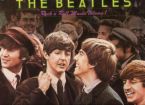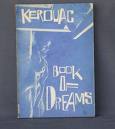 THE LITERARY BEAT TRIFECTA
THE LITERARY BEAT TRIFECTAMy beat poet based traveling adventures are over for the year, but I continue my quest to read all of the "Dulouz Legend" in the entirety. I recently finished three Kerouac books in a row and would like to share my perceptions and comparisons.
Tristessa: "Jack the Lover"
This is simply a novellette about a love gone south. It was published in 1960 and is a brief 96 page tribute to an affair that really wasn't. Over a period of a couple of years, Jack visits Mexico, and his life there was intertwined with two women and the people they knew, the life t hey lived there in Mexico City. One of the women is Tristessa, a junky who Jacks falls for due to beauty alone. He finds her captivating and frequently shares space in her worn adobe living quarters with her, her older female companion, a chihuahua, a flea-ridden young cat, a rooster, a chicken, and a dove. In between and sometimes during, he hangs out with "Old Bull Lee", one of Kerouac's pseudonyms for William Burroughs, a heroin addict and former junky, as well as another in the beat poet umbrella, and travels back and forth again from New York City.
hey lived there in Mexico City. One of the women is Tristessa, a junky who Jacks falls for due to beauty alone. He finds her captivating and frequently shares space in her worn adobe living quarters with her, her older female companion, a chihuahua, a flea-ridden young cat, a rooster, a chicken, and a dove. In between and sometimes during, he hangs out with "Old Bull Lee", one of Kerouac's pseudonyms for William Burroughs, a heroin addict and former junky, as well as another in the beat poet umbrella, and travels back and forth again from New York City.
 hey lived there in Mexico City. One of the women is Tristessa, a junky who Jacks falls for due to beauty alone. He finds her captivating and frequently shares space in her worn adobe living quarters with her, her older female companion, a chihuahua, a flea-ridden young cat, a rooster, a chicken, and a dove. In between and sometimes during, he hangs out with "Old Bull Lee", one of Kerouac's pseudonyms for William Burroughs, a heroin addict and former junky, as well as another in the beat poet umbrella, and travels back and forth again from New York City.
hey lived there in Mexico City. One of the women is Tristessa, a junky who Jacks falls for due to beauty alone. He finds her captivating and frequently shares space in her worn adobe living quarters with her, her older female companion, a chihuahua, a flea-ridden young cat, a rooster, a chicken, and a dove. In between and sometimes during, he hangs out with "Old Bull Lee", one of Kerouac's pseudonyms for William Burroughs, a heroin addict and former junky, as well as another in the beat poet umbrella, and travels back and forth again from New York City.The language in this one is poetic prose, and leans on the entirely sad, suffering, and sappy existence of Jack as a Lover, Jack as a Man. It speaks of the desolation of loving someone you can never really touch, and seeing the beauty that lies behind a true ugliness. It was the possibly the best of the three novels I read, although the next one is very close in quality.
Visions of Gerard: "Jack the Boy"
The most amazing thing about this book is the details related in the story of the death of Jack's older brother, an unusually beautific character in the road of life. The reason those details amaze me is that those remembrances of Gerard, told with such clarity, were memories from very early childhood. Gerard was nine when he died of rhuematic fever, and Jack was only four years old at his bro ther's funeral. Yet, out of this time, Jack wrote 130 pages detailing remembrances of Gerard, of his character, of specific events, some details imagined as it might have happened or as according to family legend, but some as nuggets gleamed in true reflective memory.
ther's funeral. Yet, out of this time, Jack wrote 130 pages detailing remembrances of Gerard, of his character, of specific events, some details imagined as it might have happened or as according to family legend, but some as nuggets gleamed in true reflective memory.
 ther's funeral. Yet, out of this time, Jack wrote 130 pages detailing remembrances of Gerard, of his character, of specific events, some details imagined as it might have happened or as according to family legend, but some as nuggets gleamed in true reflective memory.
ther's funeral. Yet, out of this time, Jack wrote 130 pages detailing remembrances of Gerard, of his character, of specific events, some details imagined as it might have happened or as according to family legend, but some as nuggets gleamed in true reflective memory.Kerouac's friends when he was growing up used to refer to his as "Memory Babe", because of his amazing ability to remember details. His friend and fellow beat poet Lucien Carr says of him in Jack's Book: An Oral Biography of Jack Kerouac that "He really had a memory like few men that you will meet...He had a fantastic memory". In none of his other books is that as clear as this one, where he recollects his brother, family, hometown, and family history with such specificity. He describes Gerard's relationships with the people, places, and animals around him, little facets of personality, such as the way he held his head and the way he described his experience.
This is the sweet story of a family dampened with loss, a loss young Jack doesn't percieve as so terrible. The last six months of Gerard's life, he lived with such pain that little four year old Jack ran to greet his papa to tell him excitedly of Gerard's death. Throughout this historical character study, you can almost see why Jack would be almost gleeful - in his mind, Gerard was able to leave the earth and head to Heaven, where he had wanted to go, even perhaps with his little wagon pulled by two white lambs right up to God Himself, a dream depicted often by a slowly dying Gerard.

In this story, you also get to see the town of Lowell, MA, through the eyes of the young boys. You can imagine, like a black and white movie, this small town in 1920s Massachusetts, the sister nuns who spend time talking with Gerard, whom they consider to be blessed, the Catholic school and ceremonious prayers, and the raging of the Merrimac River, also all present in differing form in the next book as well.
After reading this book, I can see how this experience in Jack's life shaped him and inspired him to be the writer he became. Perhaps the act of remembering was developed here, in trying to keep Gerard's spirit alive through memory alone, and the first stabs at darkness, a darkness in the back of Kerouac's soul that inspired him to type up the experiences of his life into novels.
This is my least favorite Kerouac book of all time, and I almost didn't even finish it. I had no interest in reading it, even coming from someone who adores hearing descriptions of Lowell and Kerouac's childhood.
 The only reason I decided to continue reading it was because the biography of Kerouac I am reading now talks about the meaning of the book and helped me to understand it in a different way.
The only reason I decided to continue reading it was because the biography of Kerouac I am reading now talks about the meaning of the book and helped me to understand it in a different way.I didn't like it because it was such a departure from the typical Kerouac style of retelling an experience like he was telling a friend. The story is similiar to Visions of Gerard in that it relays some of his childhood, but he intertwines it with a fantasy involving a mysterious shadowy vampiresque figure who visits the area in a final climax with his battle against a great snake. The Doctor Sax of this odd fantasy is reminiscent of The Shadow, a radio personality of the time period who seemed to be a great influence on Kerouac. The book and its final pages seem to speak of a coming of age and the transition between a man and a boy.
Next entry - Florida!



























No comments:
Post a Comment